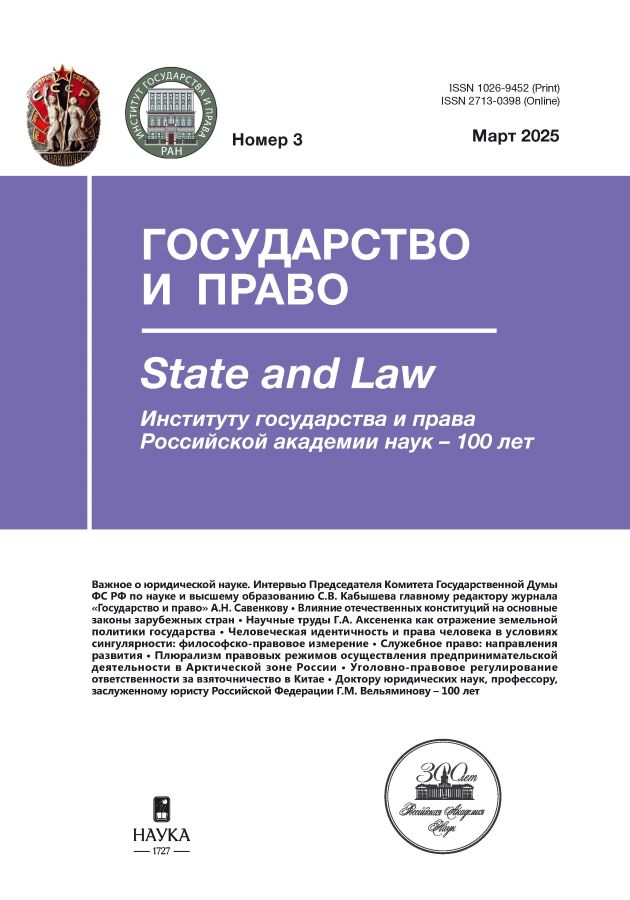The concept of “life” in the classical philosophy of International Law (T. Hobbes, G. Grotius, D. Vico)
- Autores: Karakulyan E.A.1
-
Afiliações:
- National Research Lobachevsky State University of Nizhni Novgorod
- Edição: Nº 3 (2025)
- Páginas: 58–67
- Seção: Legal, political, philosophical and religious thought
- URL: https://filvestnik.nvsu.ru/1026-9452/article/view/683017
- DOI: https://doi.org/10.31857/S1026945225030055
- ID: 683017
Citar
Texto integral
Resumo
The period of transformation of the international system that we are currently experiencing makes it necessary to search for different or new approaches to the subject of international legal regulation. Modern International Law should be interpreted primarily as intercivilizational law. In this context, it is necessary to consider the conceptual and theoretical foundations of the complex doctrine of vital rights of humans, peoples and states, which is important and essential for understanding the main issues of the philosophy of International Law in the new conditions. If the sovereign of T. Hobbes usurps the idea of life, and in the theory of G. Grotius elements of international sociality appear in terms of the diversity of sovereign “ways of life”, then the anthropological and civilizational approach of D. Vico to the content and essence of the “law of peoples” contains initial attempts to go beyond linear and universalist logics of the Enlightenment, which determined the future pro-colonial discourses in the science of International Law, the criticism of which becomes relevant in modern conditions of the international crisis.
Texto integral
Sobre autores
Emil Karakulyan
National Research Lobachevsky State University of Nizhni Novgorod
Autor responsável pela correspondência
Email: isoforma@yahoo.fr
PhD in Law, Associate Professor of the Department of European and International Law
Rússia, 23 Gagarin Ave., 603106 Nizhny NovgorodBibliografia
- Althusius J. Politica. URL: https://www.rulit.me/books/politika-read-62654–1.html (accessed: 31.03.2024) (in Russ.).
- Vico D. The foundations of a new science about the common nature of nations. M., Kiev, 1994. Pp. 19, 80, 99, 100, 104, 110, 114, 149, 159, 164, 165, 169, 196, 226, 237, 1209 (in Russ.).
- Hobbes T. Leviathan. M., 2001. Pp. 11, 37, 56, 73, 96–98, 113, 114, 117, 118, 138, 143, 161, 177, 200, 246 (in Russ.).
- Grotius G. On the law of war and peace. Reprint, from the 1956 edition. M., 1994. Pp. 19, 48, 49, 52, 62, 63, 84, 85, 87, 90, 92, 105, 128, 161, 188, 193. 212, 312, 318, 420, 439, 519, 551, 552, 603, 722, 730, 816, 823 (in Russ.).
- Karakulyan E. A. The doctrine of vital human rights, nations and peoples in the context of the philosophy of International Law // Herald of the Lobachevsky NU. 2022. No. 2. Pp. 43–52 (in Russ.).
- Schmitt K. Leviathan in the doctrine of the state by Thomas Hobbes / transl. from German by D. V. Kuznitsin. SPb., 2006 (in Russ.).
- Althusius J. Politica. An Abridged Translation of Politics Methodically Set Forth and Illustrated with Sacred and Profane Examples, ed. and Trans. Frederick S. Carney. Foreword by Daniel J. Elazar (Indianapolis: 1995 Liberty Fund). URL: https://oll.libertyfund.org/titles/althusius-politica (accessed: 31.03.2024).
- Guilhot N. (2010). American Katechon: When Political Theology Became International Relations Theory. Constellations, 17 (2). Pp. 224–253. URL: https://doi.org/10.1111/j.1467-8675.2010.00586.x (accessed: 31.03.2024).
Arquivos suplementares










